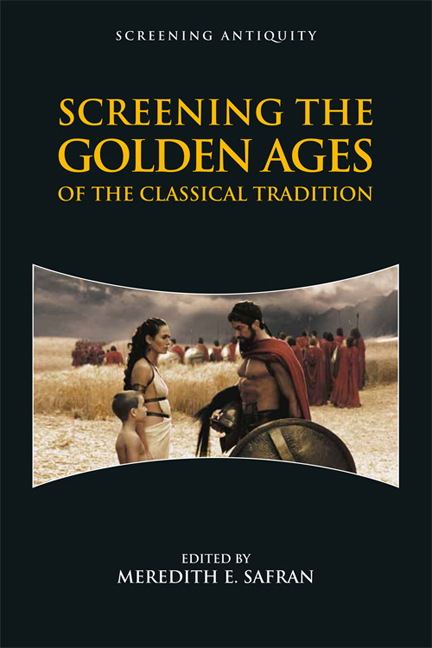Book contents
- Frontmatter
- Contents
- Series Editors’ Preface
- Editor's Acknowledgments
- Contributors
- Illustrations
- Abbreviations
- Introduction: Searching for Gold in an Age of Iron
- PART I THE GLORY THAT WAS GREECE
- 1 Re-(en)gendering Heroism: Reflective Nostalgia for Peplum's Golden Age of Heroes in Hercules: The Legendary Journeys 2.14 (1996)
- 2 Kissed by the Muse of Roller-Disco: Utopia versus the Golden Ages of America, Hollywood, and Classical Myth in Xanadu (1980)
- 3 Gilding American History through Song Culture in O Brother, Where Art Thou? (2000)
- 4 A Leonidas for the Golden Age of Superhero Films: The Thermopylae Tradition in 300 (2006)
- 5 The Dueling Greek Golden Ages of 300: Rise of an Empire (2014)
- 6 Confronting the Ancient Greek Golden Age in Jules Dassin's Phaedra (1962)
- 7 Pericles, Cincinnatus, and Zombies: Classicizing Nostalgia in The Walking Dead (2010–)
- PART II THE GRANDEUR THAT WAS ROME
- Filmography
- Bibliography
- Index
6 - Confronting the Ancient Greek Golden Age in Jules Dassin's Phaedra (1962)
from PART I - THE GLORY THAT WAS GREECE
Published online by Cambridge University Press: 23 November 2019
- Frontmatter
- Contents
- Series Editors’ Preface
- Editor's Acknowledgments
- Contributors
- Illustrations
- Abbreviations
- Introduction: Searching for Gold in an Age of Iron
- PART I THE GLORY THAT WAS GREECE
- 1 Re-(en)gendering Heroism: Reflective Nostalgia for Peplum's Golden Age of Heroes in Hercules: The Legendary Journeys 2.14 (1996)
- 2 Kissed by the Muse of Roller-Disco: Utopia versus the Golden Ages of America, Hollywood, and Classical Myth in Xanadu (1980)
- 3 Gilding American History through Song Culture in O Brother, Where Art Thou? (2000)
- 4 A Leonidas for the Golden Age of Superhero Films: The Thermopylae Tradition in 300 (2006)
- 5 The Dueling Greek Golden Ages of 300: Rise of an Empire (2014)
- 6 Confronting the Ancient Greek Golden Age in Jules Dassin's Phaedra (1962)
- 7 Pericles, Cincinnatus, and Zombies: Classicizing Nostalgia in The Walking Dead (2010–)
- PART II THE GRANDEUR THAT WAS ROME
- Filmography
- Bibliography
- Index
Summary
A stylish updating of an ancient Greek myth to 1960s Europe, Jules Dassin's Phaedra (1962) self-consciously evokes the past: both the world of ancient Greek myth, in which the story of Phaedra finds its origin, and the work of playwrights who told her story in dramatic form, stretching back to the first extant dramatic treatment. In Euripides’ tragedy Hippolytus (produced in 428 bce), Phaedra, wife of the Athenian king Theseus, conceives an overwhelming passion for her stepson Hippolytus, Theseus’ son by an Amazon queen and thus an ethnic outsider to the Greek community. Through Phaedra, the goddess Aphrodite wishes to punish Hippolytus for his lack of reverence toward her and rejection of all women in favor of the virgin goddess Artemis. When Hippolytus learns of his stepmother's lust, he is horrified, and in response to his rejection Phaedra takes her own life – only after she pens a suicide note accusing Hippolytus of rape. When an enraged Theseus reads the note, he calls upon his own father, the sea-god Poseidon, to kill his son. As he flees into exile, Hippolytus is fatally trampled when his horses are spooked by a bull that emerges from the sea. At the play's end, the goddess Artemis informs Theseus, too late, of his son's innocence.
In interviews and writings, Dassin and his artistic collaborators relate their film to “Greek tragedy,” and modern critics tend to assume Euripides’ play as the source-text for Phaedra. Yet Dassin's Phaedra is hardly a straightforward adaptation of that oldest and perhaps best-known source. Rather, Dassin incorporates elements from later retellings of Phaedra's story with his own stark innovations to create a palimpsestic film that is both akin to and alienated from its earliest predecessor. Andrew Horton writes that Dassin's “decision to do a loose adaptation of the original tragedy allowed him the freedom he needed to re-shape the myth as he wished. Thus, Dassin uses the ancient text as a starting point rather than as an end.” Despite this move away from the ancient text, however, Dassin repeatedly draws attention to the film's origins in Greek myth and tragedy through visual imagery.
- Type
- Chapter
- Information
- Screening the Golden Ages of the Classical Tradition , pp. 119 - 136Publisher: Edinburgh University PressPrint publication year: 2018

